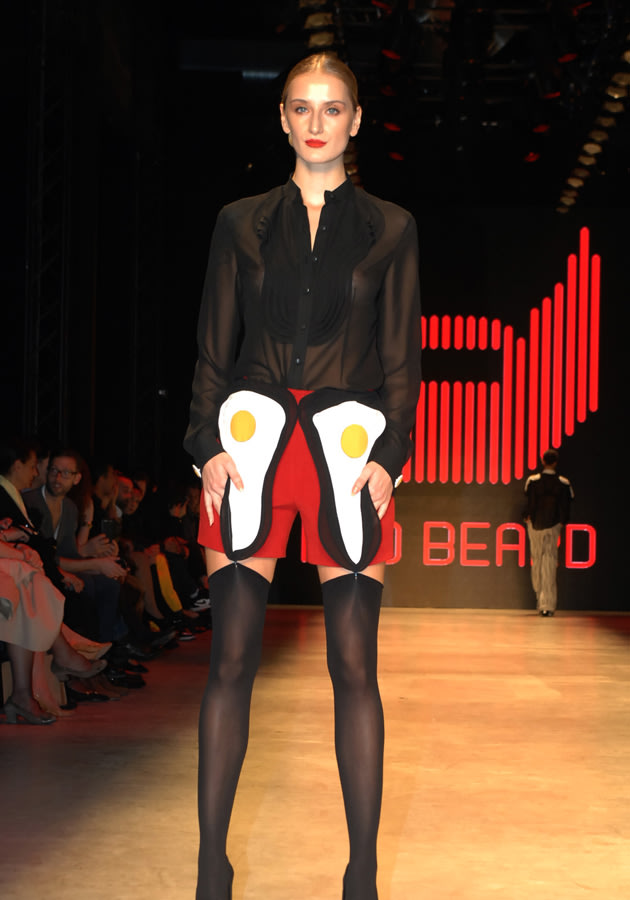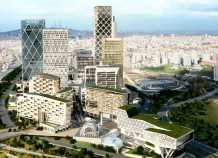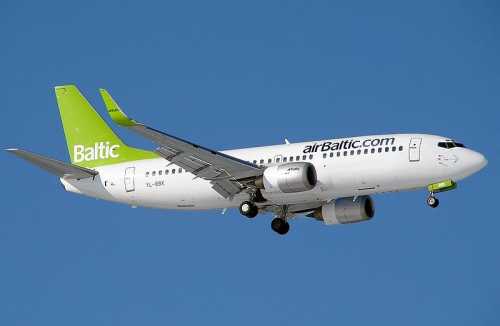Tanju Babacan puts Istanbul Fashion Week on the map with bizarre ‘fried egg chic’
Istanbul Fashion Week makes a splash with Tanju Babacan’s odd egg fashion

By Nicola McCafferty | Yahoo Lifestyle – 21 hours ago
Istanbul Fashion Week might not be as highly-regarded in the fashion industry as the likes of London, Paris or Milan.
 Istanbul Fashion Week AW13: Fried egg chic was the clear theme of Tanju Babacan’s collection ©WENNBut designer Tanju Babacan has put it on firmly on the map now, thanks to the bizarre ‘fried egg chic’ he showcased yesterday.
Istanbul Fashion Week AW13: Fried egg chic was the clear theme of Tanju Babacan’s collection ©WENNBut designer Tanju Babacan has put it on firmly on the map now, thanks to the bizarre ‘fried egg chic’ he showcased yesterday.
Models for the Turkish designer had jaws dropping during his catwalk show, stepping out in a series of eye-catching looks all inspired by our favourite breakfast food.
Fried eggs were emblazoned across fur coats, dresses, blouses, skirts and even as headgear, making them a very clear, but completely odd theme to a fashion collection.
 Bacon and eggs were on the fashion menu at istanbul Fashion Week ©WENNOne model couldn’t contain her grin as she showcased a floor-sweeping black fur coat covered in fried egg appliques, with eggs even on her ear muffs.
Bacon and eggs were on the fashion menu at istanbul Fashion Week ©WENNOne model couldn’t contain her grin as she showcased a floor-sweeping black fur coat covered in fried egg appliques, with eggs even on her ear muffs.
Another stepped out in a sheer black tuxedo short with what appeared to be bacon and two egg shorts, which came complete with suspenders and wedge heels.
But probably the most shocking outfit to hit Babacan’s runway was the one-shouldered dress made entirely of fried eggs – something which wouldn’t look out of place on Lady GaGa herself.
 Istanbul Fashion Week: Fried egg fashion anyone? ©WENNThe bizarre dress wasn’t even the only eggy part of the outfit either, as the model wore a black sheer blouse half-covered in the print – with the scoop-necked full-skirted dress covered in dozens of eggs.
Istanbul Fashion Week: Fried egg fashion anyone? ©WENNThe bizarre dress wasn’t even the only eggy part of the outfit either, as the model wore a black sheer blouse half-covered in the print – with the scoop-necked full-skirted dress covered in dozens of eggs.
The model also had an egg on her head and yolk-yellow gloves as she showed the creation on the runway.
While breakfast foods were the clear theme, the designer did make sure to offer up something else to his fashion fans who may not have found the eggs, eerrr, palatable.
A cobalt-blue halterneck dress covered in cut-out holes was another striking look, although left little to the imagination.
Elsewhere, a black and yellow bold patterned high-necked dress made a real statement, along with some classic mustard coats.
Tell us what YOU think of the fried egg chic at Istanbul Fashion Week over onTwitter, now.






